
Forced Migration and the COVID-19 Response: A Spotlight on Lebanon’s Refugee Women
Today, more people than ever, live outside their country of origin. While many individuals migrate out of choice, many others migrate out of necessity. The war in Syria has resulted in one of the worst humanitarian crises of our time with over 4.8 million Syrian having fled to neighboring countries including Lebanon, which hosts the largest number of Syrian refugees per capita. [2]
Nearly 4 in 5 of the Syrian who have had to flee the civil war in Syria were women and children. Since the onset of the Syria crisis, the majority of women have taken on increased responsibilities within the household. Women independently heading their households now account for more than a quarter of the half a million household, struggling daily to meet ends need. However, even faced with these worrying circumstances, many Syrian women are demonstrating remarkable resourcefulness in the countries where they have sought refuge. [3]
The Global Health Institute (GHI) at the American University of Beirut has made it one of its missions to support Syrian refugees and host communities, namely female Syrian refugees who constitute more than half of the total caseload of Syrian refugees living in Lebanon. GHI has done this through various empowerment projects and initiatives targeting refugee women specifically; all of which exhibit strong alignment with numerous UN Sustainable Development Goals (SDGs).
Since the start of COVID-19, the GHI team has been committed to initiate key projects in an effort to prevent and contain the transmission of the virus. The COVID-19 Refugee Support Program (CRSP) is one of GHI’s initiatives launched in response to the COVID-19 pandemic. CRSP aimed to establish and support a community-based network of GHI previously trained Syrian refugee women by equipping them with contextualized and evidence-based information on COVID-19. The living arrangements of this population in specific, the high level of misinformation circulating related to COVID-19 and the inadequate availability of credible media sources may facilitate the spread of COVID-19 and consequently create a public health emergency in light of the current global pandemic. Moreover, the high burden of NCDs among these refugees makes them vulnerable to complications and hospitalization. Consequently, this initiative is serving as a pivotal approach to increase the awareness, through a mobile social-distancing application, in an effort to reduce and control the spread of the virus among Syrian refugees and mitigate its effect, allowing them to seek early life-saving care when necessary.
The mobile aspect and the distant learning approach used for the delivery of the information offered women from refugee and rural settings the chance to acquire tailored and contextualized COVID-19 information, safely disseminate this information and act as reference points in their respective communities. Through this initiative, GHI intended to reach Syrian refugees from all over Lebanon, leaving no one behind. The recruitment included 53 Syrian refugee women residing in different regions in Lebanon: Beirut, South, North and Beqaa, acting as community health workers (CHWs) within their areas. A number of tailored and straightforward educational videos and infographics were created by the CRSP expert committee and sent to the CHWs to disseminate within their community.
Through this CHWs network, GHIs educational content aiming to raise awareness over COVID-19, have reached around 3000 Syrian refugee in Lebanon until date.
This article is published to coincide with International Migrants Day 2020. The Refugee Health Program at GHI works closely in the areas of Forced Migration, COVID-19 Response among Refugee Communities, as well as training and development. Learn more, here
Filters:Refugees, COVID-19, Lebanon, Gender, Women
Contributors
[1]: Project Coordinator, COVID-19 Refugee Support Program, Global Health Institute, American University of Beirut, Lebanon
References
[2]: UNHCR. (2016b). Syria conflict at 5 years: the biggest refugee and displacement crisis of our time demands a huge surge in solidarity [Press release]. Retrieved from http://www.unhcr.org/news/press/2016/3/56e6e3249/syria-conflict-5-years- biggest-refugee-displacement-crisis-time-demands.html
[3]: UNHCR. (2014). Left Behind Refugee Education In Crisis. Retrieved from https://www.unhcr.org/59b696f44.pdf


